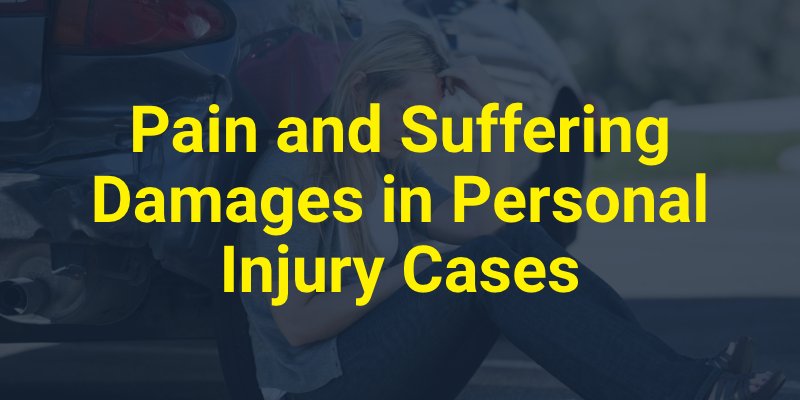In a legal context, damages refer to monetary compensation you may be awarded if a court determines that another person acted negligently or intentionally, and these actions caused you harm. This compensation aims to put you back in the position where you would have been had the harmful incident, such as a car accident, not occurred. There are different categories of damages, most often including the following.

Economic losses are ones you can precisely calculate. They include lost wages if you are unable to work because of injuries, medical bills for treatment received, and the cost of replacing damaged property. These are quantifiable amounts that can be summed up with exact figures based on supporting documentation like invoices or work records.
Non-economic losses are less tangible but nonetheless real; this is the category that pain and suffering falls under. Pain and suffering is a legal term that encompasses the physical pain and emotional distress a victim might endure following an accident. Pain and suffering can refer to physical and emotional pain and suffering.
Physical pain refers to any discomfort or agony caused directly by injuries sustained in the incident. This could range from broken bones, bruises, burns, or any form of harm inflicted on your body.
Emotional or mental suffering on the other hand addresses the mental difficulties you have endured due to your injury, such as anxiety, depression, or loss of sleep triggered by the accident and/or your injuries. A car accident lawyer in Phoenix can help you file a claim for these damages.
Calculating pain and suffering can be complex due to its intangible nature. However, there are several fundamental factors considered:
Impact on Daily Life and Activities: If your injury interferes with daily activities, prevents you from working, imposes lifestyle changes such as needing help for mobility purposes, these elements become pivotal in determining compensation amounts.
Severity and Permanence of Injuries: The more severe your injuries are, the greater your pain and suffering will likely be estimated. Further, if these injuries leave permanent damage such as disfigurement or ongoing physical disability rather than just temporary discomfort or inconvenience, this would significantly amplify damages awarded.
Strength of Evidence: Having concrete evidence can significantly bolster your claim for pain and suffering damages. Some of the most compelling evidence will include:
Medical records are vital pieces of evidence. They don’t only verify the fact that you were injured, but also detail the extent of those injuries, costs incurred in treatment, prognosis for recovery, and implications these issues might have on your daily life.
Therapy notes capture your mental and emotional state following the incident, showing the psychological impact that the injuries have had on you over time. This could include anxiety or depression and anxiety symptoms or sleep disturbances, which feed into the calculation of pain and suffering damages.
Personal diaries can also provide a valuable record of how your life has been affected by the injury on a daily basis; they can be useful to showcase the disruption in your normal activities brought about by both physical pain and mental distress from the accident.
Concrete evidence like this helps paint a comprehensive picture of the genuine impact of injuries on your life.
In some states, there are legislative caps or limits imposed on the amount you can be awarded for non-economic damages such as pain and suffering. However, Arizona is not one of these states:
“No law shall be enacted in this state limiting the amount of damages to be recovered for causing the death or injury of any person, except that a crime victim is not subject to a claim for damages by a person who is harmed while the person is attempting to engage in, engaging in or fleeing after having engaged in or attempted to engage in conduct that is classified as a felony offense.”
This means if you’re pursuing a civil claim within this state’s courts, there won’t be a statutory ceiling capping your potential compensation for pain and suffering.
If you have any questions or need help with a personal injury claim, contact our Phoenix personal injury lawyers today to schedule a free consultation.